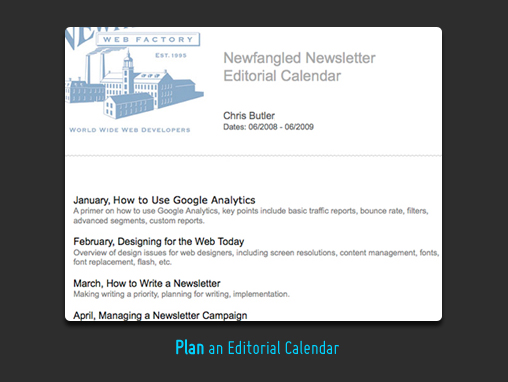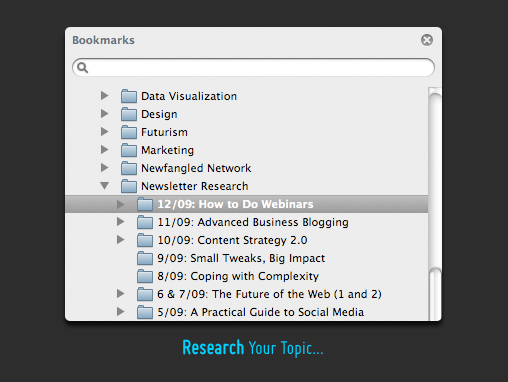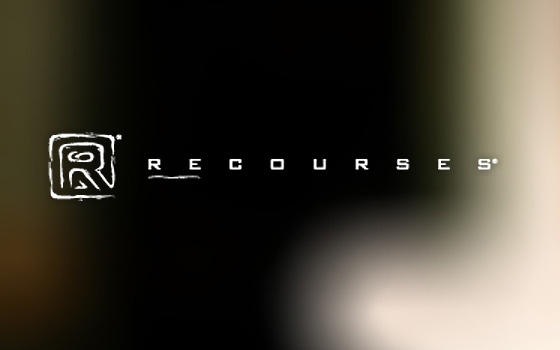While reading (the first of the non-written disciplines of writing) is, ideally, a much more inspiring and motivational experience, the next two are the ones upon which your ability to write actually hinge.
Unless you are only going to write something good once, planning is essential. It’s the structure to which you will hold yourself accountable when the going gets tough—which will likely be right after you get started. The kind of planning you’re going to need to do comes in two basic forms: (1) Planning what you will write and (2) Planning when you will write. These really are basic, so I’m not going to spend much time waxing poetic about them…
Planning What You Will Write

Creating an editorial calendar, which commits to a content schedule in advance, will create the deadline-driven pressure you need in order to maintain your content strategy. It could be as simple as committing to publishing a newsletter on the first Wednesday of every month, and outlining (in advance) the topics you’ll cover in each for the next quarter, or as complex as planning a weekly blogging schedule for multiple authors. No matter how simple it is—even a cluster of post-it notes next to your desk would be better than nothing—you’ve got to do it. Without this kind of planning, I guarantee you won’t meet your goals. I’m a broken record on this. Here. And here. And here. And here. And here. And… Well, you get the idea.
Planning When You Will Write
Anyone can create an editorial calendar, but actually committing time to write is much more difficult. There are all kinds of barriers to it. For instance, you might have the kind of role in your firm that really doesn’t give you much flexibility during the day to actually sit down and write. On the other hand, you might have this flexibility but find that you’re still much too distracted at the office to actually get any writing done. Knowing these things is the first step to figuring out what will work for you.
What really matters is that you can determine the conditions that are most conducive to your writing productivity and facilitate them on a regular basis. That might mean that, for a time, you have to add some hours to your schedule. Or, it might mean that you clear out some time in your schedule but need to relocate in order to actually use that time well. The conditions sometimes change slightly for me, but I generally know that I’m not likely to get writing done during the normal workday at my office. Thankfully, I’m an early riser and enjoy getting in before things get busy and using some of that time to write. But I also will regularly spend some evening time writing, too. With two adorable children, Mark doesn’t have the same early-morning or evening flexibility I have right now, so he blocks a few hours out in his daytime schedule every week to leave the office in order to get this work done. Though they look quite different, both systems work. More of this admonition here and here.
Research

Research flows right out of planning. As soon as you’ve committed to writing about a subject, the holes in your knowledge about it will seem intimidatingly large. It’d be nice if you could just “top up” your knowledge somehow, but research is incredibly challenging. The appeal of having a finished article can quickly lose its luster after a few hours of searching for the right information, gathering data, taking notes, interviewing people, etc. From this point of view, a great tagline for research might be, “Research: Preventing Embarrassment Since…Always.” At the very least, consider the research work a necessary step to preventing significant credibility loss by publishing a poorly informed opinion or something just flat-out wrong.
Another way to think about research is that it’s just purposeful, organized reading. From that perspective, much of my reading actually is research, as apposed to strictly reading for pleasure. To make sure I’m doing this efficiently, I’ve created a pretty strict process for reading I do online, which enables me to get through much more material than I would otherwise. You don’t have to do exactly what I do, but a system of some kind would probably be helpful.
One note for sanity’s sake: If you do end up becoming a human synthesizer, don’t forget that it’s ok to let some stuff pass you by. Seriously.

The good news is that research pushes you back into reading, the first non-written discipline of writing, and tends to expose you to new information that will shape your planning. You might find enough information about a topic that makes you rethink your publishing schedule, especially if it relates to something that people seem to care about right now. On that note, social media can be a great research tool. I’ve received a lot of insight by sourcing readers as an initial approach into a topic using tools like LinkedIn and Twitter.
If you’d like to hear more about writing, check out my slideshare presentation (with audio) on professional writing for the unprofessional writer.


